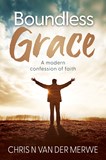Extract | Boundless Grace

Introductory Remarks
When I started writing about God’s grace, a seemingly opposite concept, namely ‘justice’, soon came to mind. These two concepts, which are connected in the Bible, seem to exclude each other. Grace implies that one receives what one does not deserve; justice means that one (must) get what one deserves. Both are valued positively in the Bible – justice perhaps stronger in the Old Testament and grace in the New Testament. How they are interconnected in the Christian faith is a central theme in this book.
The message of the New Testament is that Jesus took the punishment for human sin upon himself and attained absolution for those who believe in him. This belief in the vicarious suffering of Jesus has raised questions among many people. Was Jesus’ brutal death necessary? Why does God not forgive unconditionally without demanding a sacrifice? Is God the Father limited in his grace and forgiveness? And what kind of father is so cruel that he sends his son to a cross? Not even an earthly father would conceive such an idea. Furthermore, it is extremely unfair that an innocent person like Jesus should pay for the sins of others.
These kinds of questions have also occurred to Christians. Chris Ahrends, in a circular published on the internet from the Centre for Christian Spirituality (27 April 2018), rejected the traditional doctrine of the Church on Jesus’ death. He writes: ‘God has never required punishment or sacrifice for sin. Atonement – the act of becoming at one with God – is not about paying a debt. Forgiveness does not require a ransom’. For him, it is illogical to speak of a God of love who is also a God of vengeance.
Christian Wiman, after hearing that he was terminally ill, wrote about his reactions to this news in a book titled My Bright Abyss: Meditations of a modern believer: ‘God was gone, and not simply in an intellectual sense, […] not in the God-is-dead style of coffee-shop existentialists, but really gone.’ Being immersed in a void of meaninglessness, what had made sense to him previously sounded like nonsense to him now: ‘I don’t know what it means to say that Christ “died for my sins” (who wants that? who invented that perverse calculus?)’ (p. 134). All that could still comfort him was the knowledge that Jesus, through his suffering, has an intimate understanding of human pain and loneliness. However, the vicarious death of Jesus made no sense to him anymore.
The biblical idea that humans are sinful from birth has also led to much criticism. This is a depressing view and creates bad self-esteem; many think that the Christian faith makes people gloomy and depressed. The belief in heaven and hell arouses anxiety and doubt – anxiety about hell and worries about getting to heaven. Many believe it is a harsh and unjust doctrine – a heaven that is reserved for people who have the ‘right’ beliefs and a hell that is destined for those who do not accept Jesus’ salvation. Will the billions of people who don’t believe in Jesus, including those who have never heard of him, be tortured in an eternal fire? Can a God of love, the God proclaimed by the Christian Church, come up with such an idea? In any case, Christian denominations differ so much among themselves that it would be difficult to determine who believes ‘right enough’ to escape hell. The concepts of heaven and hell contain a strange form of ‘justice’ and show very little grace.
These are the issues dealt with in this book. I would like to write from a fresh perspective about conventional Christian doctrines that have been preached for centuries, and I hope to formulate them in a plausible way to the questions of modern people. Central to the book is the reflection on the meaning of Jesus’ death and resurrection. I write as a believing doubter, one who believes in the saving power of Jesus Christ, but not with an arrogant, judgemental attitude toward those who think and believe differently. I do not claim to have the final answers to the above questions or that I can exhaust the profound meaning of Jesus’ life, death and resurrection. However, I sincerely hope the thoughts that follow will nevertheless provide some light to readers grappling with these questions.
Chapter 1
In the Beginning
‘In the beginning, God created the heavens and the earth.’ These are the opening words of the first chapter of the Bible, proclaiming the greatness of the Creator. The earth was desolate and empty, we read, but then God created order in the chaos; the earth was shrouded in darkness, but the Spirit of God made the light shine into the darkness. More than once, we read: ‘And it was so’ – indicating that it was the word of the Creator that created all things. The reader’s eyes are opened to the magnificence of creation, to the wonders we so easily take for granted: the variety of plants and animals; the wonder of the sun, the moon and the stars; and the beauty of human beings, male and female, the crown of creation. The goodness of God’s creation is also repeated, and the chapter ends as follows: ‘God saw all that he had made, and it was very good.’ The story of creation in Genesis 1 is not a scientific exposition based on empirical research but a mythical story filled with significant truths: that the heavens and the earth did not come into being by chance but were created by God, whose wisdom and power are evident through creation.
The joyful mood at the beginning of Genesis does not last long. God created Adam and Eve to serve and obey him in freedom, but this very freedom gave them the option of rebelling against God. And that is exactly what happened. The Evil One makes his entry into Paradise and entices the human couple to violate God’s commandment. It sounds like a very childlike, implausible story told in Genesis 3 of a paradise in the distant past, inhabited by just two people, the only people on earth; of a serpent that speaks to them and is cunning enough to seduce them; of God who walks in the Garden of Eden when the evening wind rises; and of a couple who get into significant trouble for eating the forbidden fruit.
This part of the story, too, should not be viewed as a historical account but as a myth – not a myth in the popular meaning of the word, as a fabrication, but in the sense of a story dealing with essential truths: the nature of human beings and the meaning of human existence. The myth of the Fall contains truths that are still very relevant. It is about the responsibility of choices and the loss of innocence and about wrong choices that have disastrous consequences. It reveals the reality of evil and unrestrained desires; it tells of human beings who do wrong because they want to be the gods of their own lives; it is about transgressions that evoke feelings of guilt and separate human beings from God. In Chapter 11, I will expand on the importance of myths and link Jesus’ death and resurrection to age-old myths that Jesus confirms and transforms.
Sin is contagious; it spreads from one person to the next and from one generation to the following one. This is evident from the subsequent events recounted in Genesis. The parents’ rebellion against God’s commandment passes on to the next generation and leads to quarrels and murder. Strife ensues between the two sons of Adam and Eve, Abel and Cain. Cain kills Abel and becomes a cursed person, and he, like his parents, ‘went out from the Lord’s presence’ (Gen. 4:16). The parents set a bad example, and the child imitates it. The contagious nature of sin is also evident in the history of the world. Time and again, people infect each other to follow evil leaders with destructive policies. That has led, over the course of time, to a heavy burden of collective guilt on humanity.
Thankfully, God’s grace is also contagious. His grace opened a ‘fountain’ on Calvary, which spread its healing through the followers of Jesus as an antidote to create a ‘healing pandemic’ to conquer the destructive effects of sin. (This is elaborated on in Chapter 18, about the overflowing cup.) The Fall after the creation led to the re-creation in Jesus Christ. The Gospel of John links Jesus’ coming to the opening words of Genesis 1:1–5:
In the beginning was the Word, and the Word was with God, and the Word was God. He was in the beginning with God. All things came into being through him, and without him, not one thing came into being. In him was light, and the light was the light of all people. The light shines in the darkness, and the darkness did not overcome it.
As God created the heavens and the earth through his word, likewise the recreation takes place through a word – but now a living Word, the Son of God who revealed God’s being and God’s will. After the big bang of the first creation followed the second ‘bang’ of the recreation. As God created light in the beginning, similarly, the Word brought light to the earth, the symbolic light of the knowledge of salvation. And as God created life in the beginning, so Jesus created life – a new, everlasting life. Eternal life, for which sinful humans were not ready (Gen. 3:22), was offered to human beings through the coming of Jesus. In Jesus, there was light and life, we read, and his light shines into the darkness of the world. No one will ever be able to extinguish it, although the forces of darkness will still try to overwhelm it (John 1:5).
Twice in the first chapter of the Gospel of John, it is mentioned that grace and truth came to the earth through Jesus (John 1:14, 17). Jesus’ truth has more than one facet. He revealed the holiness of God but also the sinfulness of human beings:
He was in the world, and though the world was made through him, the world did not recognise him. He came to that which was his own, but his own did not receive him (John 1:10, 11).
The crucifixion would make it clear that most people could not endure the light of the sinless Son of God and tried with all their might to extinguish it. But Jesus’ coming also revealed the truth of God’s grace, a grace that overshadows human sin. Slaves of sin could become God’s children through Jesus, recipients of eternal life through the Holy Spirit (John 1:12–13). A new beginning was made.

